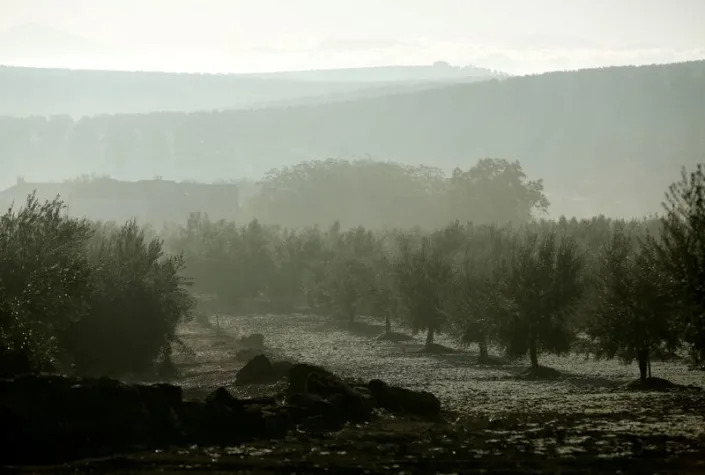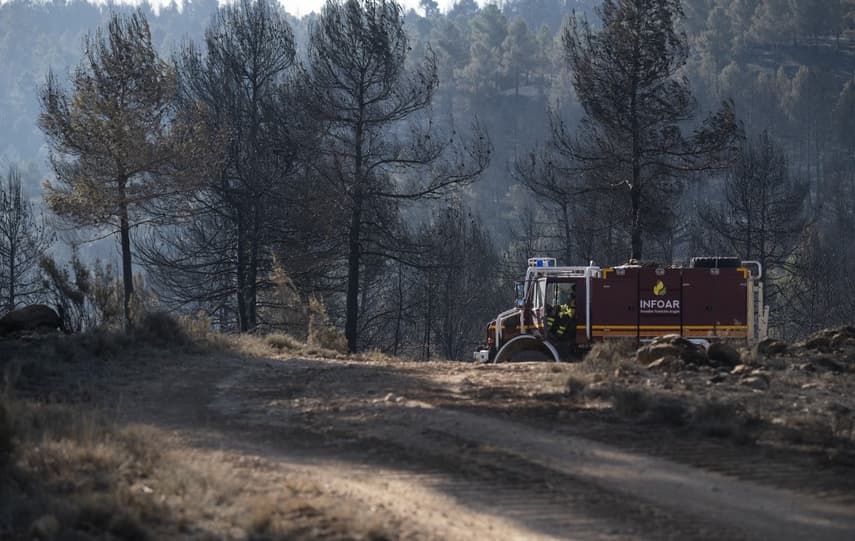Spain's drought devastates olive oil output, drives world prices up

Olive trees stand in a grove in Porcuna, southern Spain
2
Reuters
Fri, March 24, 2023 at 8:45 AM MDT·2 min read
MADRID (Reuters) - Drought in Spain, the world's largest olive oil producer, is likely to halve the country's output this year compared with the previous year, official estimates from the European Commission show, pushing prices up.
Spain usually supplies about 40% of the world's output. However, heatwaves when the olive trees were flowering last spring and a severe drought since last summer in Spain and in number two and four producers Italy and Portugal have shrunk stocks.
Only the EU's third biggest largest producer, Greece, which was not hit by the weather conditions, was expecting production to improve, though not enough to offset the decline in Spain.
"It's a catastrophe," said Primitivo Fernandez, head of Spain's National Association of Edible Oil Bottlers, as he highlighted the conjunction of drought, economic crisis and the war in Ukraine.
Spanish exporters' association Asoliva estimates there will be at least 10% less olive oil available worldwide this year from the 3.1 million tonnes produced in the season ending in 2021.
"Every day that goes by without rain, the forecasts get worse," Dcoop, Spain's largest olive oil producers' cooperative, told Reuters.
In Spain, the price of bottles of olive oil rose by around 60% in 2022, according to industry groups and companies consulted.
The price hike was initially triggered by a scarcity of sunflower oil last year after Russia invaded Ukraine. But soaring inflation, costlier fertilisers and the drought continue to push prices upwards.
A litre of virgin olive oil is sold in Spain for over 7 euros ($7.51), when in February 2022 the price was below 5 euros.
The price hikes have reduced sales volumes of olive oil in Spain by 8% in the year to February, according to a study by consulting firm Nielsen.
($1 = 0.9318 euros)
(Reporting by Corina Pons and Emma Pinedo; Editing by David Latona, Inti Landauro and Alison Williams)

Olive trees stand in a grove in Porcuna, southern Spain
2
Reuters
Fri, March 24, 2023 at 8:45 AM MDT·2 min read
MADRID (Reuters) - Drought in Spain, the world's largest olive oil producer, is likely to halve the country's output this year compared with the previous year, official estimates from the European Commission show, pushing prices up.
Spain usually supplies about 40% of the world's output. However, heatwaves when the olive trees were flowering last spring and a severe drought since last summer in Spain and in number two and four producers Italy and Portugal have shrunk stocks.
Only the EU's third biggest largest producer, Greece, which was not hit by the weather conditions, was expecting production to improve, though not enough to offset the decline in Spain.
"It's a catastrophe," said Primitivo Fernandez, head of Spain's National Association of Edible Oil Bottlers, as he highlighted the conjunction of drought, economic crisis and the war in Ukraine.
Spanish exporters' association Asoliva estimates there will be at least 10% less olive oil available worldwide this year from the 3.1 million tonnes produced in the season ending in 2021.
"Every day that goes by without rain, the forecasts get worse," Dcoop, Spain's largest olive oil producers' cooperative, told Reuters.
In Spain, the price of bottles of olive oil rose by around 60% in 2022, according to industry groups and companies consulted.
The price hike was initially triggered by a scarcity of sunflower oil last year after Russia invaded Ukraine. But soaring inflation, costlier fertilisers and the drought continue to push prices upwards.
A litre of virgin olive oil is sold in Spain for over 7 euros ($7.51), when in February 2022 the price was below 5 euros.
The price hikes have reduced sales volumes of olive oil in Spain by 8% in the year to February, according to a study by consulting firm Nielsen.
($1 = 0.9318 euros)
(Reporting by Corina Pons and Emma Pinedo; Editing by David Latona, Inti Landauro and Alison Williams)
AND WILDFIRES DON'T HELP
AFP - news@thelocal.es • 25 Mar, 2023

A fire truck is pictured in a forest area near the village of Los Peiros, on March 25, 2023, affected by a wildfire that began on March 23, 2023 near Villanueva de Viver. Photo: JOSE JORDAN/AFP
Some 700 firefighters were battling Spain's first major forest fire of the year Saturday, which was raging out of control 48 hours after it began, forcing 1,500 people to flee.
In an update on Twitter, the regional emergency services said the fire in Villanueva de Viver, some 90 kilometres (55 miles) north of Valencia, was a "highly-complex blaze taking place in weather conditions similar to those of the summer".
"700 people have been mobilised for the operation (to fight the fire). It has affected 3,900 hectares and has a 35-kilometre perimeter," they said, indicating the number of people forced out of their homes on Friday, some 1,500, had not changed.
They said the huge blaze remained "very voracious" with the work to put it out "very complicated".
Firefighters tweeted that they had deployed some 20 aerial units to help tackle the fire.
"Clearly the fire has not stabilised because it is still burning with great ferocity given that the weather conditions are almost like summer," Ximo Puig, leader of the Valencia region told Spain's RTVE public television.
The fire began just after midday (1200 GMT) on Thursday.
Firefighters said the blaze was more typical of summer than of late March. With the vegetation dried out by a lack of moisture in the atmosphere in recent months and large amounts of combustible biomass in the forests, conditions were "perfect" for such a blaze, Manolo Nicolas of the Castellón firefighters had told public radio on Friday.
In 2022, which was a particularly bad year for wildfires in Europe, Spain was the worst-hit country with nearly 500 blazes that destroyed more than 300,000 hectares, according to figures from the European Forest Fire Information System (EFFIS).
Some 700 firefighters were battling Spain's first major forest fire of the year Saturday, which was raging out of control 48 hours after it began, forcing 1,500 people to flee.
In an update on Twitter, the regional emergency services said the fire in Villanueva de Viver, some 90 kilometres (55 miles) north of Valencia, was a "highly-complex blaze taking place in weather conditions similar to those of the summer".
"700 people have been mobilised for the operation (to fight the fire). It has affected 3,900 hectares and has a 35-kilometre perimeter," they said, indicating the number of people forced out of their homes on Friday, some 1,500, had not changed.
They said the huge blaze remained "very voracious" with the work to put it out "very complicated".
Firefighters tweeted that they had deployed some 20 aerial units to help tackle the fire.
"Clearly the fire has not stabilised because it is still burning with great ferocity given that the weather conditions are almost like summer," Ximo Puig, leader of the Valencia region told Spain's RTVE public television.
The fire began just after midday (1200 GMT) on Thursday.
Firefighters said the blaze was more typical of summer than of late March. With the vegetation dried out by a lack of moisture in the atmosphere in recent months and large amounts of combustible biomass in the forests, conditions were "perfect" for such a blaze, Manolo Nicolas of the Castellón firefighters had told public radio on Friday.
In 2022, which was a particularly bad year for wildfires in Europe, Spain was the worst-hit country with nearly 500 blazes that destroyed more than 300,000 hectares, according to figures from the European Forest Fire Information System (EFFIS).

No comments:
Post a Comment